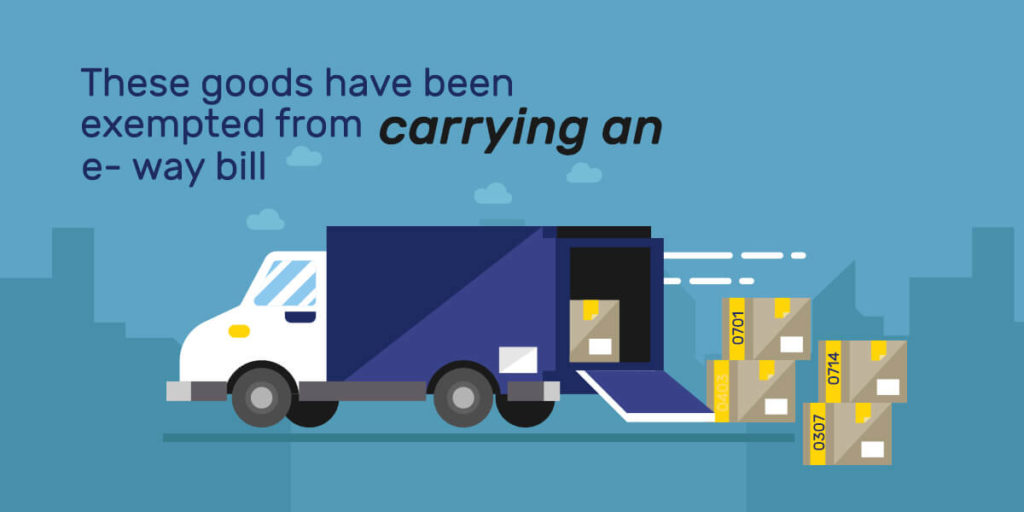Topic
- Introduction
- Who has to carry e-way bill?
- Who will generate E way Bill?
- Exemptions in carrying e way bill
- Generation of E-way bill
- Documents to be carried while movement of goods
- Value included in the e way bill
- Validity of e way bill
- Extension of validity of e way bill
- Cancellation of E Way Bill
- Notification 2 to 6/2018 UTT dated 31.03.2018
- Conclusion

Introduction:
E way bill is a new concept developed in the Goods and Service Tax system in India. Its main objective is to ensure better tax monitoring and better tax compliance. Every goods movement with certain exception has to be accompanied by additional document known as e-way bill. The focus of this new piece of legislation is to keep a track on the movement of goods keeping tax interest in view. The concept of e way bill is covered in Rules 138 and 138A to 138D of the GST Rules.
Who has to carry e-way bill ?
All GST paid goods movement having value above Rs. 50,000/- must accompany e-way bill. There are certain exemptions and conditions which we will be covered in the coming sections.

Who will generate E way Bill?
- The registered supplier has to generate E way Bill. The supplier has been given this responsibility as he is aware of the entire information related to transportation. However the recipient may also generate E way bill based on the information received from the supplier.
- Transporter may also generate E way bill based on information received from supplier/ recipient.
- Where goods are transported from an unregistered person to a recipient who is a registered person then the recipient has to generate the E way bill. In such case the transport is said to be carried out by the recipient and he will be treated as supplier for the purpose of the law.
- An unregistered person who is causing movement of goods has an option to generate E way bill.
- A registered person or transporter causing movement of goods having less than Rs.50, 000/- has an option to generate E way bill.
Exemptions in carrying e way bill

No e way bill is required for the following categories
- Transportation of goods specified in Rule 138 of the Central Goods and Service Tax Rule,2017
This includes
- LPG supplies to household and non domestic exempted category customers.
- Kerosene oil sold under PDS.
- Postal Baggage transported by Department of Post.
- Natural or cultured pearl and precious and semiprecious stones, precious metals and metals clad with precious metals.
- Jewelry, goldsmith and silversmith’s wares and other articles in chapter 71.
- Currency
- Used personal and household effects.
- Coral- unworked / worked.
- Transportation of goods by non motorized conveyance.
- Transportation of goods from port, airport, air cargo complex and land customs station to Inland Container Deport or Container Freight Station.
- Movement of goods within area notified under Rule 138(14)(d) of the GST Rules of the state concerned.
- Goods (other than de-oiled cakes) as specified in schedule appended to notification 2/2017 CT (Rate) dated 28.06.2017. This is list of goods exempted.
- Alcoholic liquor for human consumption, petroleum crude, high spirit diesel, motor spirit (petrol), natural gas or aviation turbine fuel.
- Goods in Schedule III of CGST Act, 2017 which has been declared as no supply.
- Goods transported under custom bond and supervision of ICD, CFS, port, airport, customs station etc. under Customs seal.
- Transit cargo from or to Nepal or Bhutan.
- Where goods are exempted under relevant notification.
- Movement of goods under defense under Ministry of Defense as consignor or consignee.
- Transport of empty cargo containers.
- Transport of goods upto a distance of 20kms from the place of business of consignor to a weighbridge for weighment. However in such instance the goods must be accompanied by delivery challan in accordance with rule 55.
- Where empty cylinder for packing of LPG are being moved for reason other than supply.
Generation of E-way bill
E way bill has two parts
- Part A contains basic details like GSTIN number of recipient, place of delivery, invoice number/ challan number, value of goods etc.
- Part B contains transport details.
Process of generation:
- Go to the GSTN portal where E way bill could be generated prior to movement of goods.
- Furnish the information in Part A of Form GST EWB-01 in the portal.
- Furnish the information in Part B of Form GST EWB-01.
- E way bill will be generated on submission of information as given above.
Documents to be carried while movement of goods
- Invoice/ Bill of supply/ delivery challan.
- A copy of the e way bill.
Value included in the e way bill
The e way bill shall include the value of all taxable goods that is carried in the cargo. If taxable and nontaxable goods are both carried in a single invoice then the value of exempted goods shall be excluded from the value for the purpose of calculation the Rs,.50,000/- limit for e way bill generation.
Validity of e way bill
| Sl. No. | Distance | Validity period |
| 1 | Upto 100kms | One day in case of other than Over dimensional cargo |
| 2 | For every 100km or part thereof thereafter | One additional day in case of other than Over dimensional cargo |
| 3 | Upto 20kms | One day in case of Over dimensional cargo |
| 4 | For every 20km or part thereof thereafter | One additional day in case of Over dimensional cargo |
Here Over Dimensional Cargo means cargo carried as a single indivisible unit and which exceeds the dimensional limits prescribed in Rule 93 of Central Motor Vehicle Rules, 1989 made under Motor Vehicle Act, 1988.
Extension of validity of e way bill
- There may be circumstances where the goods cannot be transported within the prescribed time limit. In such exceptional situations the validity of the e way bill may be extended by uploading the details in Part B of the FORM GST EWB-01.
- Commissioner upon recommendation of GST council may extend the validity of e way bills for certain items by issuing a notification.
Cancellation of E Way Bill
It goods mentioned in the e way bill are not transported or details of transportation is altered then the e-way bill may be cancelled in 24 hours. However the e way bill which has been verified during transit cannot be canceled.
Notification 2 to 6/2018 UTT dated 31.03.2018
The above notification has relaxed the requirement of carrying e way bill in the state of Andaman & Nicobar Island, Chandigarh, Dadra and Nagar Haveli, Daman and Diu and Lakshadweep.
Conclusion:
Though being an added effort for the taxpayers, e way bill is an important milestone for the tax law legislation in India. It will help the government to better track the movement and enforce better tax compliance. The tax evaders could be brought to books more easily than before. This very thing may look scary to the people from the industry but any improvement in tax collection will ultimately lead to more tax equalization. This will eventually benefit the industry and people of the country at large.
You may also read about concept of valuation in GST
and E invoicing

